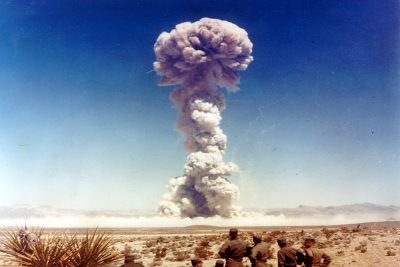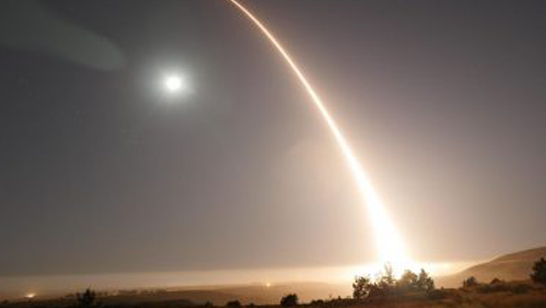
The question of nuclear non-proliferation in the Middle East is complex and there is no simple recipe to follow.
First, a large number of nuclear warheads exist unacknowledged in Israel. It has long led to concern and bitterness in the region that Israel has not been willing to forego this capability and commit itself under the NPT like other states in the region and to accept IAEA safeguards.
Second, Iran is developing an industrial scale enrichment capability that will allow it to produce low enriched uranium fuel for power reactors but also – should it so decide – high enriched uranium for nuclear warheads. The prospect of Iran acquiring nuclear weapons or even a capacity to develop such weapons has already raised tension in the region. It is currently driving an enormously expensive arms race: as oil flows out, weapons flow in… Armed action is not excluded even though it would certainly not get any authorization from the Security Council of the UN and would have unforeseeable consequences.
Third, there is a concern that if the present tension is not defused more states in the region may over time seek to acquire nuclear weapons or, at least embark on enrichment.
Iran insists – correctly — that the Non Proliferation Treaty encourages the use of nuclear energy and that it permits its parties to embark upon enrichment and other fuel cycle activities. However, it must be understood that while some states, like Japan and Brazil, have done so, the development of fuel cycle activities in areas of tension is bound to raise serious concern. Theoretically, very effective inspection – including application of the IAEA additional protocol — should be capable of creating confidence that all installations are used only for peaceful purposes. This is an option currently advanced by some as a way out of the acute controversy about Iran’s fuel cycle program.
A safer approach is undoubtedly that states embarking on nuclear power programs in areas of tension agree between themselves– perhaps for a specific period of time – to renounce activities like the enrichment of uranium. In 1991, North and South Korea reached such an agreement.
For its part, the Security Council has insisted that Iran should suspend its fuel cycle activities. While the Council is backing this demand by economic sanctions, at the same time it seeks to engage Iran in talks and holds out benefits to Iran in return for suspension.
Iran is correct in claiming that NPT parties have the right to pursue programs for the peaceful use of nuclear energy, but it must be recognized that the NPT certainly imposes no duty upon any party to embark upon enrichment or other fuel cycle activities. NPT parties like Iran are thus free – if they find it advantageous – to renounce or suspend enrichment and reprocessing for a period of time. For most states – including Iran – such activities can hardly be economically attractive or necessary to assure the supply uranium fuel.
At the present time (November 2010) it looks likely that talks may start between Iran and a wider group of states and it is to be hoped that these talks will result in an agreement that reduces current tensions. The talks might have a very narrow scope and cover only the question of the 20 % enriched fuel needed for the Triga reseach reactor or they might be of broader scope and have regard to a suspension of the Iranian enrichment program, as demanded by the Security Council.
Whether or not talks with Iran in the near future will yield results that reduce current tensions the recommendation of the 2010 NPT Review Conference on the subject of a nuclear weapon free zone in the Middle East must be considered. As we know, the concept was launched long ago by Egypt and Iran and all states in the region have pronounced themselves in favour of the concept. Israel’s support has consistently been subject to the proviso that the zone could be established only following a peace settlement and Israel has so far seemed negative to the conference urged by the parties to the NPT.
Although a zonal approach to reduce nuclear generated tensions in the Middle East is far more ambitious than other options and may take more time to negotiate than other options now discussed it deserves to be analyzed. Some factors may make it more attractive and plausible in the next few years than it has been in the past.
A first point to make is that while a principal aim of past discussions has been to eliminate Israeli nuclear weapons, a major new concern is the nuclear weapon option that an enrichment program offers Iran and could offer any other country in the region embarking upon similar programs. An up to date zonal agreement would need to address such concerns and could do through an agreed renunciation by all states in the region of weapons and sensitive activities for a period of, say 25 years. It would have to be combined with various guarantees from the outside world, for instance of the supply of fuel for nuclear reactors and, perhaps, of the return of spent fuel.
To-day, as before, Israel would, in all likelihood declare that any discussion about a zone requiring a unilateral elimination of Israel’s nuclear weapon capability was premature and could be taken up only following a peace settlement. However, an approaching Iranian nuclear weapon option and the possibility of further states in the region embarking upon nuclear fuel cycle activities change the picture. The new question arises – for Israel and the other states in the region –whether it would not be preferable that all countries in the region renounce both nuclear weapons and enrichment and other sensitive activities than face a situation in which there were two or more states with nuclear weapons or weapons options.
Iran has invested much resource and prestige in and enrichment program that would have to be suspended. However, the installations would not be the first nuclear facilities prematurely closed in the world and the economic and political benefits that would accrue from a settlement would be great.
A second point is that it will be hard to defer discussion of nuclear weapons and fuel cycle installations until after a peace settlement. At the latest, these questions would have to be a part of the peace process. Indeed, a zonal agreement would probably make a peace settlement somewhat less difficult. In any case there do not seem to be any good reasons for deferring discussion of a zonal agreement. It would certainly also fit well into the present global efforts to move the whole world toward eliminating nuclear weapons and to avoid nuclear fuel cycle activities – notably in sensitive areas – adding to the risk of proliferation.
A third point to make is that – as many agreements about nuclear weapon free zones demonstrate – a zonal arrangement in the Middle East could contain important special features desired by the parties. Although the integrated safeguards system of the IAEA – including the Additional Protocol – would be available to a zone and offer a high degree of verification effectiveness, the long standing suspicions in the Middle East would probably call for some verification in addition to those performed by the IAEA. There might be arrangements for bilateral verification – as in ABBAC between Argentina and Brazil. The EURATOM treaty also has its own regional verification system that long operated independently of the IAEA but has come to be harmonized with the international IAEA verification.
EURATOM sought to build confidence between the members not only through its own verification system but also by providing a framework for practical cooperation between the parties. Schemes for the joint development of research, regulation or construction and operation of nuclear installations may, indeed, be important to ensure transparency and mutual confidence. Slovenia and Croatia are the joint owners of a nuclear power plant and there might be similar arrangements in other regions, for instance between some Baltic states.
As has been shown in an analysis presented by Professor Gregoire Mallard, and also by fellow ELN member and former Prime Minister of the Netherlands, Ruud Lubbers, it may be fruitful to examine the EURATOM treaty for ideas that could be useful in a zonal nuclear arrangement for the Middle East. Israel would have much expertise and experience to offer in such a zone of positive cooperation. Israel would also gain: the international restrictions that now apply to export of nuclear material and technology to Israel would disappear.
While the material gains of a nuclear zonal arrangement are a substantial attraction the greatest gain would be a drastic reduction in tensions. The latest figures we have heard about weapons exports to the Middle East leave no doubt about the dizzying expenses of the current arms race.
The opinions articulated above represent the views of the author(s), and do not necessarily reflect the position of the European Leadership Network or any of its members. The ELN’s aim is to encourage debates that will help develop Europe’s capacity to address the pressing foreign, defence, and security challenges of our time.



